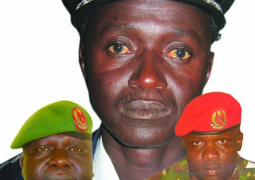The Special Criminal Court yesterday overruled the oral objection made by the defence counsel representing the 1st accused person, Alhagie Jobe, on the admissibility of both the cautionary and voluntary statements.
Alhagie Jobe, deputy editor-in-chief of the Observer newspaper earlier alleged that he was tortured prior to making his statements before a panel of investigators at the National Intelligence Agency (NIA).
This prompted the court to order a voire dire or mini-trial to ascertain the voluntariness of Jobe statements.
Alhagie Jobe, who was arraigned alongside one Mbye Bittaye, was charged with five counts of making an act with seditious intention, seditious publication, and possession of seditious publication, giving false information to public servant, and reckless and negligent, while Mbye Bittaye was arraigned on a single-count of making preparation to do act with seditious intention.
Delivering the ruling, Justice Emmanuel Nkea, stated that by an oral objection taken on 28 May2013, the defence counsel for Jobe challenged the admissibility of Jobe’s statements.
He stated that the defence raised two issues namely, that the independent witness was not present at the time the statements were recorded, and secondly the 1st accused was severely tortured to compel him make the confessions in the statements.
The judge ruled that the evidential burden was on the defence to prove that fact, and to discharge this burden of proof, the accused person must lead concrete evidence in support of the alleged torture.
He said although the accused had alleged that he was rushed to the hospital at the behest of Sukuta Jammeh, a senior NIA officer at the NIA who showed concern over the injuries he sustained from the alleged torture, and even alleged that he was medically examined and given treatment at the hospital, the accused failed or neglected to call Sukuta Jammeh as a witness, or tender any evidence of the medical treatment he received, and no explanation was proffered for that.
“The law is that allegation of torture, cruel, inhuman or degrading treatment requires forensic corroboration and without it, as seen here, one cannot satisfy the burden of proof even on the balance of probabilities,” the judge said.
Justice Nkea added that apart from the oral testimony of the accused, there was no other corroborating evidence whether viva vorce or medical in support of the alleged tortured.
“I have looked at the cautionary statement carefully and I observed that the writing thereon are so clear as not to appear to have been written by a person with a broken fingers, as the 1st accused wanted the court to believe,” he added.
The marks on his waistline were faint, and there was no further evidence to determine the cause or the date when they were inflicted, said the judge.
“I cannot, therefore, on the basis of the available evidence before me reach the conclusion that the 1st accused was severely tortured to compel him make the confession in the statements sought to be tendered, having failed to discharge the evidentiary burden on this issue,” he stated.
“I cannot resolve same in favour of the defence, and I reject same as unfounded,” Justice Nkea said.
He further stated that on the allegation that the independent witness was never present at the recording of the statements, he watched PW2 testify of his physical presence at the material time, and he saw him positively identify the 1st accused.
“I also heard PW1 testified of the physical presence of PW2 at the recording of the statements,” he said, adding that he had not seen any reason on record to disbelieve PW1and PW2 in the absence of any other compelling evidence to the contrary.
“I believed that PW2 was physically present as an independent witness when the statements were recorded from the 1st accused, and this I shall hold as a fact,” the judge said in his ruling.
“In view of foregoing, I find that the objection as to the involuntariness lacks merit. I overruled same and I hold that the confessions were made voluntarily. I shall accordingly admit the confessional statements of the 1st accused in evidence as exhibits,” he stated.
After the ruling, PW1, Jawurr Keita, was called to continue his testimony, and he told the court that apart from the purported story and the laptop that were discovered by them during the investigation, security intelligence also intercepted the email conversation of the 1st accused and Major Lamin Touray.
He added that the email copies were obtained and given to him as the investigator, the said email copies were in the case file.
At that juncture, the state counsel applied to tender the said email copies, but the defence counsel, E. Jah, raised an objection, and his objection was upheld.
The said email copies were rejected by the court.
“I know one Assan Sallah and Madikan Jobarteh on the issue,” he said, alleging that Madikan and Assan were approached by the 1st accused to write a story for someone seeking asylum.
He alleged that Assan Sallah said that Mbye Bittaye told him that he (Mbye) wanted to publish a story on homosexuality for his friend in the UK seeking asylum.
Officer Keita said during the confrontation, the 2nd accused admitted contacting Assan Sallah and also admitted that Assan warned him that this was illegal.
The case continues on 1 July 2013, for cross-examination.


